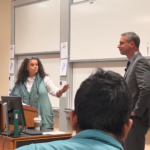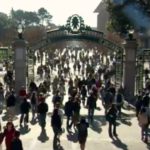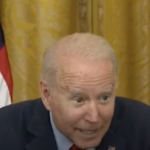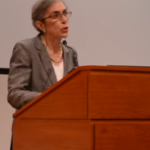Remembering August 1945
|
This week marks 65 years since the United States dropped the atomic bomb. On August 6, 1945, President Harry Truman delivered a “rain of ruin” upon Hiroshima, Japan, with Nagasaki hit three days later, killing 100,000 to 200,000. Truman’s objective was to compel surrender from an intransigent enemy that refused to halt its naked aggression. The barbarous mentality of 1940s Japan was beyond belief. An entire nation lost its mind, consumed by a ferocious militarism and hell-bent on suicide. Facing such fanaticism, Truman felt no alternative but to use the bomb. As George C. Marshall put it, the Allies needed something extraordinary “to shock [the Japanese] into action.” Nothing else was working. Japan was committed to a downward death spiral, with no end in sight. “We had to end the war,” said a desperate Marshall later. “We had to save American lives.” Evidence shows the bomb achieved precisely that, saving millions of lives, not merely Americans but Japanese. The Japanese themselves acknowledged this, from the likes of Toshikazu Kase to Emperor Hirohito himself. Kase was among the high-level officials representing Japan at its formal surrender aboard the USS Missouri. “The capitulation of Japan,” Kase said definitively, “saved the lives of several million men.” As we mark the anniversary of this period, we should first and foremost think about those boys—our fathers, grandfathers, great grandfathers, uncles, brothers, some now in their 80s and 90s—who lived lives of faith and freedom and family because of Truman’s decision. I’ve met many of them. Anytime I find myself in conversation with a World War II vet, I ask where he was when the first bomb hit. “I’ll tell you where I was!” snapped George Oakes of Churchill, Pennsylvania. “I was a 22-year-old kid on a troop transport preparing to invade the Japanese mainland…. We were sitting there as targets for kamikazes when they dropped the first one. All they told us was that there was a new weapon brought into the war that landed on Japan proper, and everything we were planning was on hold. A couple of days later, they dropped the other one.” Oakes, who served with the Army combat engineers, didn’t want to die. “I was engaged to an absolutely beautiful girl named Virginia. All I knew was that I wanted to go home.” George remembered the U.S. military’s frustration in striking Japan mercilessly in conventional bombing raids. In one case, Allied bombs killed 100,000 people in Tokyo in one night. As George Marshall noted, “It had seemingly no effect whatsoever…. [Japanese] morale was affected, so far as we could tell, not at all.” George Oakes saw that firsthand. “We were bombing the hell out of Japan with B-29s. Every Japanese soldier and person was ready to die for the Emperor. And they weren’t surrendering.” No, they weren’t. In fact, even after both atomic bombs, the Japanese War Cabinet remained deadlocked on whether to give up. The Emperor broke the stalemate. “Boy, were we thrilled,” recalled George when they got the news on their boat. They were spared an apocalyptic invasion that would have made Normandy look like a picnic at the beach. When I asked George if he felt gratitude toward President Truman, he responded with some colorful imagery: “Am I thankful? If Harry Truman walked down my street right now, I’d kiss his bare rear-end.” Instead of storming Japan with guns and grenades and flamethrowers, dodging kamikazes, shooting and stabbing and slicing and dicing not only Japanese men but screaming women-and-children-turned-combatants, George went home—to peace. He became a charter member of East Pittsburgh VFW Post 5008, and worked for Westinghouse for 44 years. He served as scoutmaster for Boy Scout Troop 98 and was a founding member, Eucharistic minister, and greeter at St. John Fisher Church. He was a frequent caller to Pittsburgh radio talk-shows and contributor to “Letters to the Editor” sections, which is where he caught my attention when I tracked him down in August 1995. Oh—and he married Virginia. George Oakes of Churchill died on Dec. 12, 2001, at age 78, an extra half-century after Harry Truman dropped the bomb, and arguably because Harry Truman dropped the bomb. For George and Virginia, married 55 years, that meant the added gift of life to three sons. He was buried with honors amid loved ones—not ripped to bloody, smoldering chunks of flesh on the death-strewn soil of Imperial Japan. George Oakes was far from alone. There were countless American boys-turned-men, husbands and dads and granddads, in the same boat. Dr. Paul Kengor is professor of political science and executive director of The Center for Vision & Values at Grove City College. This column originally appeared on the V & V website. Dr. Kengor’s books include “The Crusader: Ronald Reagan and the Fall of Communism” and the forthcoming “Dupes: How America’s Adversaries Have Manipulated Progressives for a Century.” |




